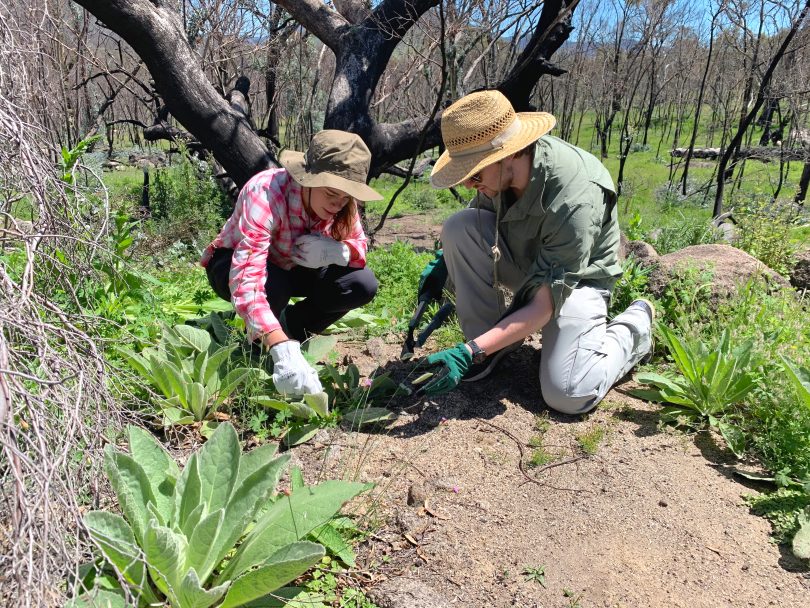
Landcare volunteers removing weeds by hand in Namadgi National Park. Photo: Landcare ACT.
Invasive weeds and animals will be targeted as part of the latest round of rural resilience grants for rural landholders in the ACT to make their properties more resilient.
Sustained rainfall has meant weeds such as St John’s wort, African lovegrass, Chilean needle grass, Paterson’s curse, blackberry, sweet briar and woody weeds have flourished, along with pest animals such as rabbits, feral pigs, deer and foxes.
Thankfully, the program does not need to include cane toads after one offending male toad was located at the Yarralumla Wholesale Nursery on Friday, 12 March.
The toad had hitched a ride in a transport truck. That threat has since been ‘eliminated’ in what ACT Conservator of Flora and Fauna Ian Walker said was a one-off incident.
Rural landholders can now apply for the grants, which will provide $200,000 to farmers in the ACT.
Landholders can apply either individually or in groups for grants of up to $10,000 for weed and/or pest animal control activities. Successful applicants will be required to match grant funding either with cash or in-kind contributions.
ACT Minister for the Environment Rebecca Vassarotti met with the ACT Rural Landholders’ Association in Tharwa on 17 March to encourage local farmers to apply for the grants.
She said farmers will need to demonstrate an ongoing commitment to the management of invasive species that enhances biodiversity, conservation and sustainable agriculture.
“The ACT Government’s ‘Rural Resilience Grants – Weed and Pest Animals Control’ grants scheme is designed to support ACT rural landholders to address weed and pest animal issues that have emerged following the drought, fires and subsequent rain,” said Minister Vassarotti.
“This grants scheme, which is on top of the work the ACT Government undertakes to combat invasive species on public land, will help both farmers and the wider community.
“Not only will farmers be able to reduce the invasive species on their properties, but there will be wider environmental benefits.”
ACT Rural Landholders’ Association president Tom Allen said the ACT farming community welcomes the rural resilience grants.
“These grants are a practical way we can improve our lands to be more sustainable and productive,” he said.
“The grants are an example of how rural landholders and government can work together to tackle an ongoing problem that affects both farming land and the wider environment.”
Grant applications are open until 23 April with all approved projects to be completed by 30 June, 2022.
More information about how to apply is on the ACT Government’s Environment, Planning and Sustainable Development Directorate website.














